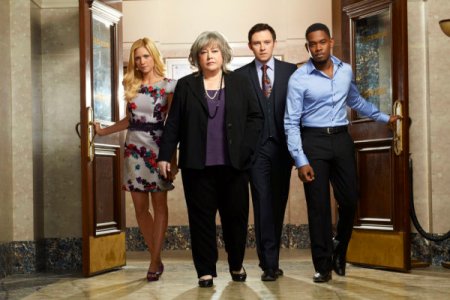This pretentious self-quotation headlines my blog. It can be seen on every post, and in every link I make to the site on Facebook, Twitter, or elsewhere. There's a reason I put the quote in a place of such high regard on this collection of thoughts. I give a lot of thought to stories. Trying to analyze what makes one good or bad, what makes one more interesting than another, where their power comes from and what kinds of messages they're being used to send.
Another matter I have considered quite a bit is what goes into a story, and realized that there are two key elements. These are what get criticized or praised depending on the quality of the tale. Good stories have both, bad stories have neither, and the mediocre have one or the other, sometimes in alteration.
The first is content. The second is method. The story told and the storytelling.
 |
| Harry's Law airs Wednesdays at 9:00pm Ea |
The show is still a law procedural, but the shoe store is more or less gone, as is Harry's central position as a lawyer for the poor and disenfranchised in the middle of inner city Cincinnati. Now she's just a lawyer handling tough cases that bring up questions of morality and social responsibility. Sound like any other law shows you can think of? How about all of them?
 |
| Wait... Harriet's law firm is associated with a shoe store? |
Basically overnight, the full time cast went from this:

To this:


You may also have noticed a difference in the style of the cast photos above. It's because the style of the show has also shifted, towards the dramatic. Long camera shots linger on people's faces to show the "dramatic tension" at almost every beat in the narrative. The dialogue makes a wild stab at an attempt towards "natural speech," by having characters repeat every other line of their conversations, but it doesn't seem to serve any purpose, both because it doesn't feel natural at all, and because the rest of the show is so contrived that these moments seem out of place.
The once episodic show, with more or less standalone episodes, now airs in pairs or trios of episodic plot arcs, meaning if you miss one, you're not going to understand any of them without watching the almost two minute long "previously on" at the top of each episode. The light-hearted nature of the show, which originally led me to believe it was a parody, is completely gone, but the show still seems to be trying to maintain its "sense of humor" by having sweet old lady Kathy Bates constantly saying things that are as caustic and rough as possible, or by forcing absurdly characterized moments with Tommy.
Change is a natural part of television. As I've mentioned before, one of the greatest challenges it poses as a storytelling medium is its length which can be indefinite and expansive. I'm used to seeing good shows change tones or plot lines between seasons. Fringe would be a perfect example. In and of itself, change doesn't bother me. What does bother me is when I can't figure out why it's happening. What was wrong with Harry's Law in season 1 that David E. Kelley felt needed to be changed? And if it was wrong in the first place, why didn't NBC just cancel the show like so many of it's other failed one-season-wonders last year? More importantly than why, though, is the question of "Where?".
What direction are these changes trying to take the show, because right now it just seems disjointed and unsure of itself. Does anyone else have any idea what the show is trying to accomplish by making such sweeping and drastic changes?
Does anyone else actually watch this show too?
No comments:
Post a Comment
Disagree with anything? Agree with anything? Just want to say "neat-o!" ? Well post a comment!